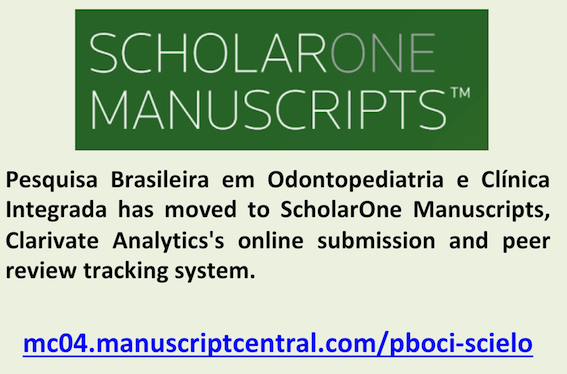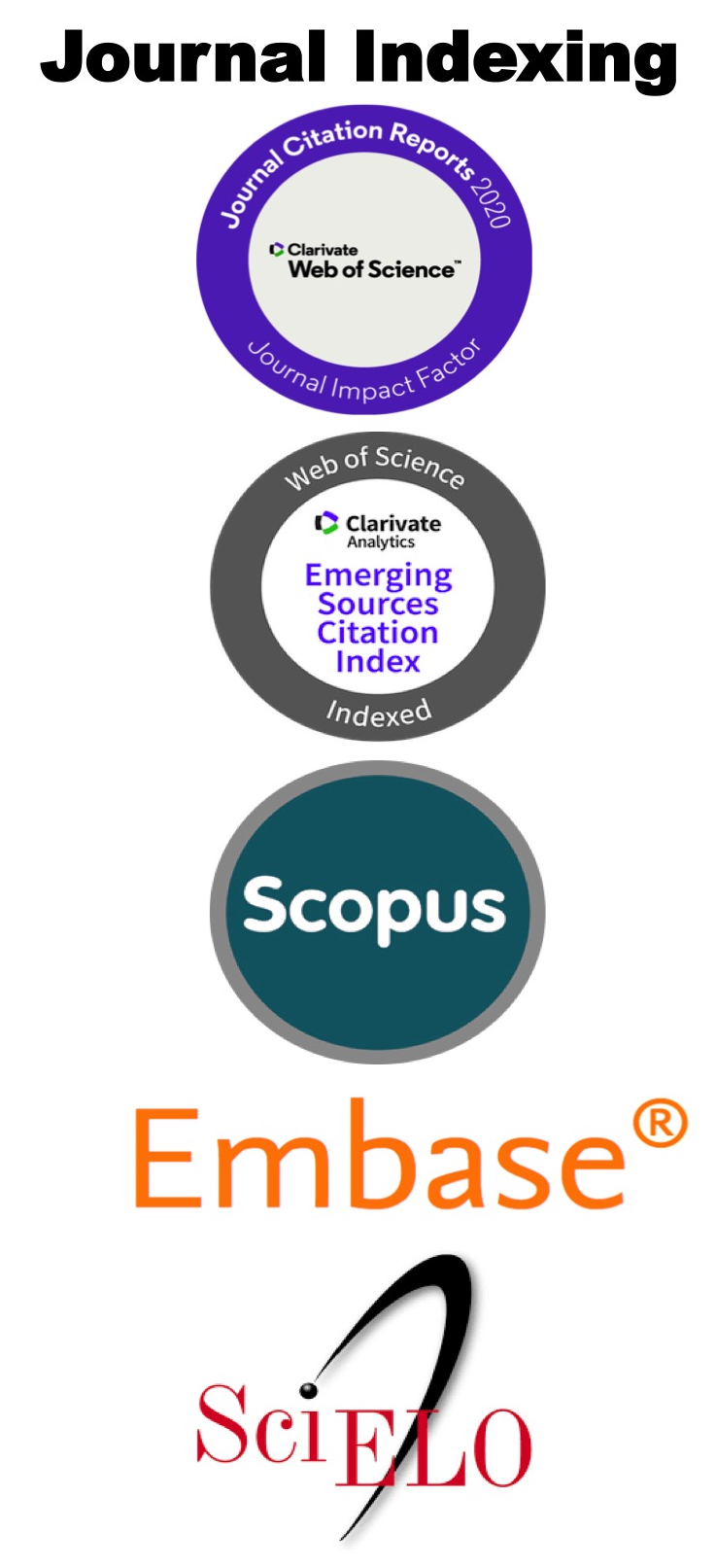Translation, Cross-cultural Adaptation and Psychometric Properties of the Parental Feeding Style Questionnaire into Brazilian Portuguese Language
Keywords:
Child, Feeding Behavior, Mothers, Surveys and Questionnaires, TranslationAbstract
Objective: To translate, cross-culturally adapt and test the psychometric properties of the Parental Feeding Style Questionnaire (PFSQ) to Brazilian Portuguese language. Material and Methods: Three stages were carried out: 1st, the 27-item of PFSQ was translated, back-translated, reviewed by a Committee of Experts and pre-tested (n=60), obtaining the cross-culturally adapted version. 2nd, the final version was self-applied by 42 mothers for internal consistency (Cronbach’s Alpha). After 2-weeks, 19 mothers answered the PFSQ again for reproducibility (Intraclass Correlation Coefficient, ICC). 3rd, 204 mothers of children aged 4-5 years answered the PFSQ for translation validation [convergent validity and exploratory factor analysis (EFA)]. Results: For subscales, Cronbach’s alpha ranged from 0.65 to 0.82; the overall reliability was 0.69, indicating substantial internal consistency. The ICC for overall PFSQ was 0.78 and for domains 0.56-0.89, indicating moderate to excellent reproducibility. ‘Control over eating’ correlated positively with ‘prompting/encouragement to eat’ and negatively with ‘instrumental feeding’; ‘prompting/encouragement to eat’ correlated positively with ‘emotional feeding’. By EFA, PFSQ items were loaded on four factors. ‘Control over eating’ and ‘prompting/encouragement to eat’ settled into two factors, whereas the ‘emotional’ and ‘instrumental feeding’ domains into one factor each. Conclusion: Despite the different factors found by AFE related to the original PFSQ, the reliability was satisfactory, making the Brazilian Portuguese version of the PFSQ adequate to assess parental feeding style.References
Powell EM, Frankel LA, Umemura T, Hazen N. The relationship between adult attachment orientation and child self-regulation in eating: The mediating role of persuasive-controlling feeding practices. Eat Behav 2017; 26:121-8. https://doi.org/10.1016/j.eatbeh.2017.02.006
Yuan WL, Rigal N, Monnery-Patris S, Chabanet C, Forhan A, Charles MA, et al. EDEN mother-child cohort Study Group. Early determinants of food liking among 5y-old children: a longitudinal study from the EDEN mother-child cohort. Int J Behav Nutr Phys Act 2016; 13:20. https://doi.org/10.1186/s12966-016-0342-5
Rodenburg G, Kremers SP, Oenema A, van de Mheen D. Associations of parental feeding styles with child snacking behavior and weight in the context of general parenting. Public Health Nutr 2014; 17(5):960-9. https://doi.org/10.1017/S1368980013000712
Wang L, van de Gaar VM, Jansen W, Mieloo CL, van Grieken A, Raat H. Feeding styles, parenting styles and snacking behavior in children attending primary schools in multiethnic neighborhoods: a cross-sectional study. BMJ Open 2017; 7(7):e015495. https://doi.org/10.1136/bmjopen-2016-015495
Wardle J, Sanderson S, Guthrie CA, Rapoport L, Plomin R. Parental feeding style and the intergenerational transmission of obesity risk. Obes Res 2002; 10(6):453-62. https://doi.org/10.1038/oby.2002.63
Jansen E, Daniels LA, Nicholson JM. The dynamics of parenting and early feeding – constructs and controversies: a viewpoint. Early Child Dev Care 2012, 182(8):967-81.
Tam W, Keung V, Lee A, Lo K, Cheung C. Chinese translation and validation of a parental feeding style questionnaire for parents of Hong Kong preschoolers. BMC Public Health 2014; 14:1194. https://doi.org/10.1186/1471-2458-14-1194
Hubbs-Tait L, Kennedy TS, Page MC, Topham GL, Harrist AW. Parental feeding practices predict authoritative, authoritarian, and permissive parenting styles. J Am Diet Assoc. 2008; 108:1154-61. https://doi.org/10.1016/j.jada.2008.04.008
Darling N, Steinberg L. Parenting style as context: An integrative model. Psychol Bull 1993; 113:487-96.
Vollmer RL, Mobley AR. Parenting styles, feeding styles, and their influence on child obesogenic behaviors and body weight. A review. Appetite 2013; 71:232-41.
Johnson SL, Birch LL. Parents’ and children’s adiposity and eating style. Pediatrics 1994; 94:653-61.
Sallis JF, Broyles SL, Frank-Spohrer G, Berry CC, Davis TB, Nader PR. Child’s home environment in relation to the mother’s adiposity. Int J Obes Relat Metab Disord 1995; 19:190-7.
Lee ZL, Gan WY, Lim PY, Hasan R, Lim SY. Associations of nutritional status, sugar and second-hand smoke exposure with dental caries among 3- to 6-year old Malaysian pre-schoolers: a cross-sectional study. BMC Oral Health 2020; 20(1):164. https://doi.org/10.1186/s12903-020-01152-0
Guillemin F, Bombardier C, Beaton D. Cross-cultural adaptation of health-related quality of life measures: Literature review and proposed guidelines. J Clin Epidemiol 1993; 46(12):1417-32. https://doi.org/10.1016/0895-4356(93)90142-n
Beaton DE, Bombardier C, Guillemin F, Ferraz MB. Guidelines for the process of cross-cultural adaptation of self-report measures. Spine 2000; 25(24):3186-91.
Manzato AJ, Santos AB. A elaboração de questionários na pesquisa quantitativa. IBILCE – UNESP, São Paulo, 2012. Available from: http://www.inf.ufsc.br/~vera.carmo/Ensino_2012_1/ELABORACAO_QUESTIONARIOS_PESQUISA_QUANTITATIVA.pdf. [Accessed on February 12, 2018]. [In Portuguese].
Cronbach LJ. Coefficient alpha and internal structure of tests. Psychometrika 1951; 16:297-34. https://doi.org/10.1007/BF02310555
Landis JR, Koch GG. The measurement of observer agreement for categorical data. Biometrics 1977; 33(1):159-74.
Streiner DL. Starting at the beginning: an introduction to coefficient alpha and internal consistency. J Pers Assess 2003; 80(1):99-103. https://doi.org/10.1207/S15327752JPA8001_18
Kramer MS, Feinstein AR. The biostatistics of concordance. Clin Pharmacol Ther 1981; 29(1):111-23. https://doi.org/10.1038/clpt.1981.18
Fiorin BH, Moreira RSL, Filho BL. Validity and reliability of the dimensional assessment scale after myocardial infarction. Rev Eletr Enferm 2020; 22:55886. https://doi.org/10.5216/ree.v22.55886
Onis M, Onyango AW, Borghi E, Siyam A, Nishida C, Siekmann J. Development of a WHO growth reference for school-aged children and adolescents. Bull World Health Organ 2007; 85(9):660-7. https://doi.org/10.2471/blt.07.043497
Damasio, BF. Uses of exploratory factorial analysis in psychology. Aval Psicol 2012; 11(2):213-28.
Artes, R. Statistical aspects of the factor analysis of rating scales. Rev Psiquiatr Clín 1998; 25(5):223-8.
Bartlett MS. A note on the multiplying factors for various chi square approximations. J R Stat Soc 1954; 16:296-8.
Kaiser HF, Rice J. Little Jiffy, Mark IV. Educ Psychol Meas 1974; 34(1):111-7.
Tabachnick BG, Fidell, LS. Using Multivariate Statistics. Needlam Heights, MA: Allyn and Bacon; 2001.
Nunnally J, Bernstein I. Psychometric Theory. McGraw-Hill: New York; 1994.
Instituto Brasileiro de Geografia e Estatística. Brasil/São Paulo/Piracicaba. Panorama. População. 2018. Available from: https://cidades.ibge.gov.br/brasil/sp/piracicaba/panorama. [Accessed on Jan 20, 2018]. [In Portuguese].
Pimenta F, Garcia IQ, Cristina S, Galvão D, Marôco J, Leal I. Validation of the parental feeding style questionnaire in a portuguese sample. Psicologia, Saúde & Doenças 2019; 20(3):740-58. https://doi.org/10.15309/19psd200315
Barbosa TS, Steiner-Oliveira C, Gavião MBD. Translation and Brazilian adaptation of the Parental Caregiver Perceptions Questionnaire (P-CPQ). Saúde Soc 2010; 19(3):698-708. https://doi.org/10.1590/S0104-12902010000300020
Agostinho AC, Sousa KG, Freitas CM, Barbosa TS. Translation, transcultural adaptation and validation of the Halitosis Associated Life-Quality Test for use in Brazilian adolescents. Pesqui Bras Odontopediatria Clin Integr 2019; 19(1):e3807. https://doi.org/10.4034/PBOCI.2019.191.14
Souza AC, Alexandre NMC, Guirardello EB. Psychometric properties in instruments evaluation of reliability and validity. Epidemiol Serv Saude 2017; 26(3):649-59. https://doi.org/10.5123/S1679-49742017000300022
Gottems LBD, Carvalho EMP, Guilhem D, Pires MRGM. Good practices in normal childbirth: reliability analysis of an instrument by Cronbach's Alpha. Rev Lat Am Enfermagem 2018; 26:e3000. https://doi.org/10.1590/1518-8345.2234.3000
Terwee CB, Bot SD, Boer MR, van der Windt, Knol DL, Dekker J, et al. Quality criteria were proposed for measurement properties of health status questionnaires. J Clin Epidemiol 2007; 60(1):34-42. https://doi.org/10.1016/j.jclinepi.2006.03.012
Özçetin M, Yilmaz R, Erkorkmaz U, Esmeray H. Reliability and validity study of parental feeding style questionnaire. Turk Pediatri Arsivi 2010; 45(2):124-31. https://doi.org/10.4274/tpa.45.124
Sleddens EF, Kremers SP, De Vries NK, Thijs C. Relationship between parental feeding styles and eating behaviors of Dutch children aged 6-7. Appetite 2010; 54(1):30-6. https://doi.org/10.1016/j.appet.2009.09.002
Pilatti LA, Pedroso B, Gutierrez GL. Psychometric properties of measurement instruments: a necessary debate. RBECT 2010; 3(1):81-91. https://doi.org/10.3895/S1982-873X2010000100005
Kidwell KM, Tomaso C, Lundahl A, Nelson TD. Confirmatory factor analysis of the parental feeding style questionnaire with a preschool sample. Eat Weight Disord 2020; 25(2):407-14. https://doi.org/10.1007/s40519-018-0613-z
Downloads
Published
How to Cite
Issue
Section
License
Copyright (c) 2023 Pesquisa Brasileira em Odontopediatria e Clínica Integrada

This work is licensed under a Creative Commons Attribution-NonCommercial 4.0 International License.



